 Buckeye Archive
Buckeye Archive  A Different Spin on Re-alignment
A Different Spin on Re-alignment
 Ever since the early 1990’s when the great shakeup of college football’s traditional alignments began in earnest, the trend has almost always gone toward expansion rather than contraction. The ACC added Florida State and three Big East defectors; the Big Eight absorbed the leavings of the Southwest Conference; the Big Ten added Penn State and Nebraska; the Pac-10 added Colorado and Utah, and so on and so forth. Very few leagues have shrunk in that span, although the Western Athletic Conference did shrivel from sixteen to nine members in 1999 with the mass defection of the schools that now make up the bulk of the Mountain West, and conferences have lost individual members here and there. For the most part it’s been bigger-bigger-bigger in the ongoing game of musical chairs.
Ever since the early 1990’s when the great shakeup of college football’s traditional alignments began in earnest, the trend has almost always gone toward expansion rather than contraction. The ACC added Florida State and three Big East defectors; the Big Eight absorbed the leavings of the Southwest Conference; the Big Ten added Penn State and Nebraska; the Pac-10 added Colorado and Utah, and so on and so forth. Very few leagues have shrunk in that span, although the Western Athletic Conference did shrivel from sixteen to nine members in 1999 with the mass defection of the schools that now make up the bulk of the Mountain West, and conferences have lost individual members here and there. For the most part it’s been bigger-bigger-bigger in the ongoing game of musical chairs.
Indeed, the future of big-time college football seems to inevitably lie in the “super conferences” covering vast expanses of territory and encompassing almost the entirety of the game. By 2011 five of the eleven FBS conferences will hold championship games with the newly christened Pac-12 likely following suit.
But what if we went another way with college football realignment? As of now there are 120 schools playing Division I-A football. That’s enough for fifteen conferences of eight teams apiece.
Atlantic Coast Conference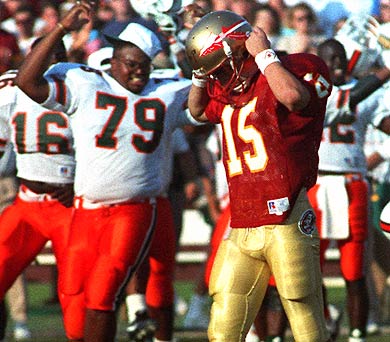
Clemson
East Carolina
Georgia
Florida State
Georgia Tech
Miami of Florida
South Carolina
South Florida
This is the Rivalry Conference. Three of the country’s most fiercely contested in-state rivalries- Clemson/South Carolina, Georgia/Georgia Tech and Florida State/Miami of Florida- are grouped here, with East Carolina and South Florida getting in where they fit in.
Big East Conference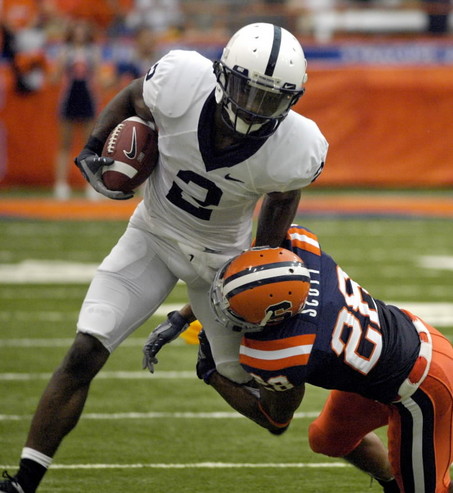
Boston College
Connecticut
Notre Dame
Penn State
Pittsburgh
Rutgers
Syracuse
Temple
The Big East gets a big upgrade in prestige with the additions of Penn State and Notre Dame. As I’ve said before, Penn State belongs in the Big East, not the Big Ten- and I absolutely refuse to put Notre Dame in any conference with Ohio State, geography notwithstanding. Temple, expelled from the Big East in 2004, returns in far better shape under Al Golden. Unfortunately for the Owls they won’t be fattening up on the likes of Kent State and Akron anymore.
Mideast Conference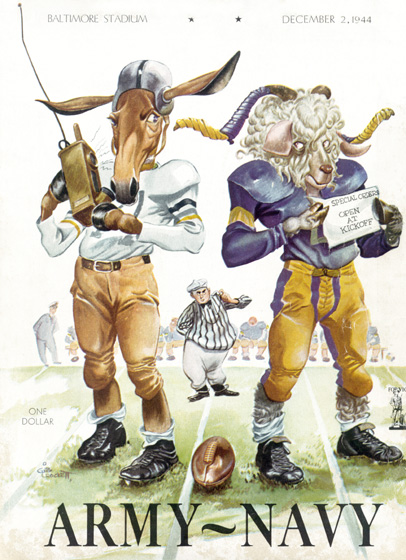
Akron
Alabama-Birmingham
Army
Buffalo
Florida Atlantic
Florida International
Navy
Troy
Otherwise known as “the dumping ground for schools at loose ends in the new arrangement,” the Mideast stretches north-south from the Lake Erie coast to South Florida and east-west from New York State to Alabama. The league doesn’t have much rhyme or reason as a collective entity- less so than any other in this alignment- but at the very least there are good or potentially good rivalries in pairs: Akron/Buffalo, Army/Navy, UAB/Troy and Florida Atlantic/FIU.
Great Lakes Conference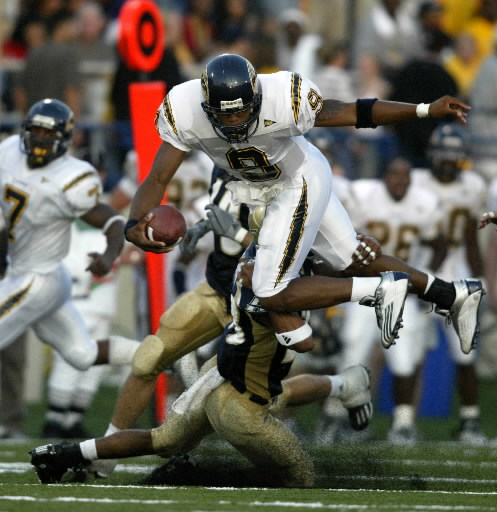
Ball State
Bowling Green
Eastern Michigan
Central Michigan
Kent State
Northern Illinois
Toledo
Western Michigan
Hence its name, this new league consists of the northernmost Mid-American Conference schools- save Buffalo and Akron- hugging the contours of the Great Lakes.
 Great Plains Conference
Great Plains Conference
Colorado
Iowa
Iowa State
Kansas
Kansas State
Minnesota
Missouri
Nebraska
For years the Big 12 North schools complained about the dominance of their conference by the South, particularly the University of Texas. The biggest complainer was the school that lost the most in the Big Eight-Big 12 transition- Nebraska. Certainly the Cornhuskers would enjoy their placement in the Great Plains, a conference they would likely run roughshod over.
Valley Conference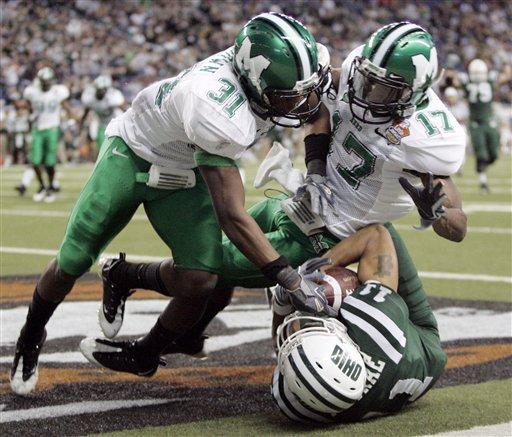
Arkansas State
Louisiana-Lafayette
Louisiana-Monroe
Marshall
Miami
Middle Tennessee State
Ohio University
Western Kentucky
Not the Missouri Valley; not the Ohio Valley; not even the Steel Valley. It’s just “The Valley,” a group of eight schools, all of them currently in either the Mid-American or Sun Belt conferences, located on or near the valleys of the Mississippi, Ohio and its various tributary rivers. Marshall is the biggest beneficiary here; the Herd ruled the MAC, have struggled in Conference USA, but can more than punch their weight in this company.
Lone Star Conference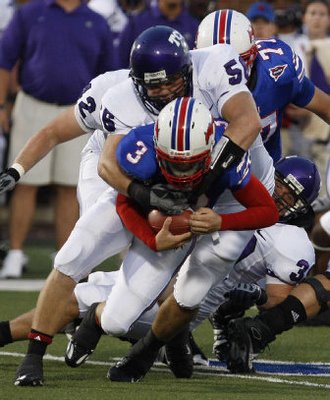
Louisiana Tech
New Mexico
New Mexico State
North Texas
SMU
TCU
Tulsa
Texas –El Paso
Five members of this conference lie within the state of Texas while three others lie in states- Louisiana, Oklahoma and New Mexico- directly adjacent. As of now TCU would absolutely crush the competition, although Tulsa has had some nice teams recently and SMU looks to be on the fast track to mid-major prominence under June Jones. The Battle for the Iron Skillet between the Horned Frogs and Mustangs would be the league’s showcase game.
Metro Conference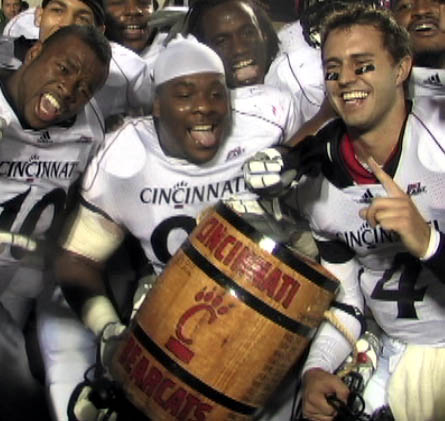
Central Florida
Cincinnati
Houston
Louisville
Memphis
Rice
Southern Mississippi
Tulane
The league that was a force in NCAA basketball during the 1980’s returns in gridiron guise, with seven of its eight members located in major metropolitan areas either on the rim or in the heart of the urban South. Most of them are currently members of Conference USA, the twelve-school monstrosity that will be distributed among five of the new leagues.
Mountain West Conference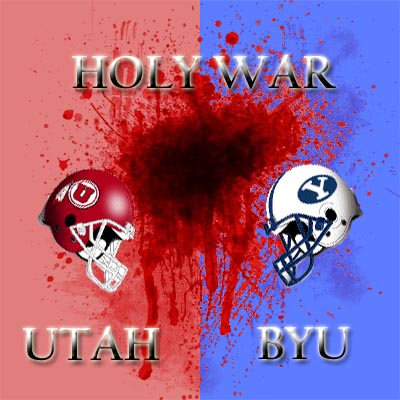
Arizona
Boise State
BYU
Colorado State
Fresno State
San Diego State
Utah
Washington State
Members of three current far-West conferences- the WAC, Mountain West and Pac-10- make up this aggregation, which consists of the most prestigious of the non-Pac-10 schools along with Washington State and Arizona. “Prestigious” might be stretching it when describing Wazzou, San Diego State and Colorado State but those schools have enjoyed periods of great success and are still somewhat promising in terms of potential.
Old Northwest Conference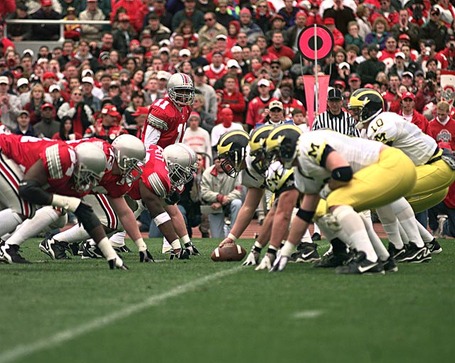
Ohio State
Michigan
Michigan State
Indiana
Purdue
Illinois
Northwestern
Wisconsin
Basically this league consists of the Big Ten schools that use “W” in their call signs instead of “K.” The “Old” in “Old Northwest” serves two purposes- it conjures up the designation of the Great Lakes region as the “old northwest” and it prevents the Northwest Conference from seeking legal action to keep its moniker from being jacked like the gold rims in Menace II Society.
Pacific Coast Conference
Arizona State
California
Oregon
Oregon State
Stanford
UCLA
USC
Washington
This is a truncated Pac-10, with Washington State and Arizona lopped off at its northern and southernmost points. Wazzou has had its moments in the Pac-10, making two Rose Bowls in six seasons back in the late ‘90s and early 2000’s but the football program has fallen on extremely hard times recently and the school itself is geographically positioned more in the WAC/Mountain West zone than in the Pac-10 zone. Arizona was one of the last two schools to join the Pac-10 along with Arizona State, coming over from the WAC in 1978. The Wildcats are also the only league member never to play in a Rose Bowl.
Piedmont Conference
Duke
Maryland
Virginia
Virginia Tech
Wake Forest
North Carolina
North Carolina State
West Virginia
This close-packed conference consists of current Big East member West Virginia and seven members of the ACC, including the four-school North Carolina contingent.
Southeastern Conference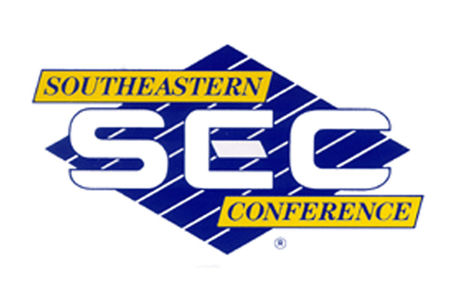
Alabama
Auburn
Florida
Kentucky
Mississippi State
Ole Miss
Tennessee
Vanderbilt
The SEC retains its traditional name but loses its two west-of-the-Mississippi members as well as Georgia and South Carolina. It does keep the Sugar Bowl tie-in, however.
Southwest Conference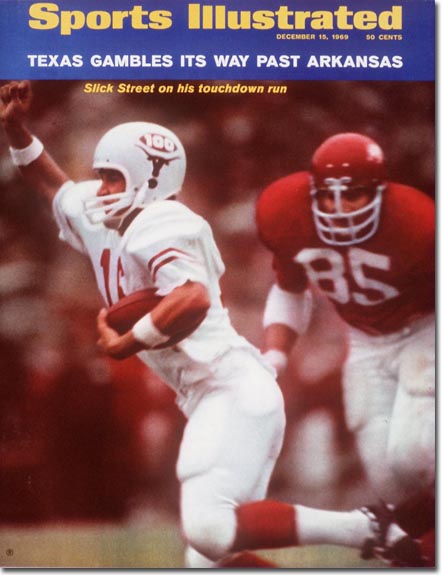
Arkansas
Baylor
Louisiana State
Oklahoma
Oklahoma State
Texas
Texas A&M
Texas Tech
The old, scandal-ridden Southwest Conference is brought back to life in somewhat different form, with current Big 12 members Oklahoma and Oklahoma State and current SEC member LSU joining former SWC stalwarts Texas, Texas A&M, Texas Tech, Baylor and Arkansas in what would surely be one of the toughest, most competitive leagues in the nation… excepting Baylor, of course.
Western Athletic Conference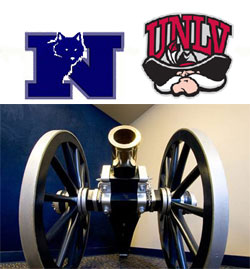
Air Force
Hawaii
Idaho
Nevada
Wyoming
San Jose State
UNLV
Utah State
The less-prestigious and less-advantaged of the far-West schools are grouped here under the old WAC name. Nevada would be the heavyweight here, at least in the short term. The Wolfpack should probably be switched with San Diego State, but the Aztecs get the nod based on potential.
*****
There are a bunch of FBS schools- the MAC, Sun Belt, several current WAC members, the service academies- that would probably be better served dropping down to the FCS. The problem is there are already more schools in I-AA than in I-A; 126, six more than in the top division. There just isn’t enough room in the FCS for thirty or so new members unless they dump some of their own dead weight- like, say, the Ivy and Pioneer Leagues. So for we keep all of the current I-A schools- even mangy dogs like Western Kentucky and Eastern Michigan- in their places, at least for this column.
Fifteen eight-team conferences would standardize schedules across the country. Each team, big-time or small, would play seven conference games. There would be no conference championship games. Since the conference schedule is shorter there is no need for a twelfth regular-season game. (Yeah, I know. $$$$$$$$$$. But I’m blue-skying here.)
And it fits well with a sixteen-team Tournament. There would be fifteen automatic bids for conference champions and one at-large bid, to be selected and seeded according to the final AP poll of the regular season. With conferences of a smaller size everyone is going to play everyone- no 2002 Ohio State/Iowa scenarios where two teams tie for the title and don’t meet- and no conference championship game means no team going undefeated in the regular season and gorking it at a neutral site in early December, a la Kansas State in 1998. You wouldn’t get many clear-cut cases, if any, of a team getting hosed out of a relatively deserving spot.
Under such an alignment a 2009 NCAA Football Tournament would have looked something like this:
16 Ohio (Valley) @ 1 Alabama (SEC)
9 Georgia Tech (ACC) @ 8 Ohio State (Old Northwest)
12 Virginia Tech (Piedmont) @ 5 Florida (at-large)
13 Central Michigan (Great Lakes) @ 4 Cincinnati (Metro)
11 Penn State (Big East) @ 6 Boise State (Mountain West)
14 Navy (Mideast) @ 3 TCU (Lone Star)
10 Iowa (Great Plains) @ 7 Oregon (Pac-8)
15 Nevada (WAC) @ 2 Texas (Southwest)
Start the Tournament the first week of December, end it with the Championship Game on New Year’s Day, and you’re good to go. It isn’t perfect- Georgia fans would probably find playing football in an entity called “the Atlantic Coast Conference” tough to swallow- but it beats what we have now. Right? Or…
- NBA Announces 2013-2014 Schedule
- Browns Ink Sharknado
- Sharknado A No-Show For Rookie Camp
- Trent Richardson Out Until Training Camp
- Browns Sign Brandon Jackson
- Carrasco Suspended Eight Games
- Browns Add to Wide Receiver Depth with David Nelson
- Browns Need to Learn from Past Draft Mistakes
- Browns Release Chris Gocong and Usama Young
- Browns Missing on Grimes Disappointing, But Not The End
The TCF Forums
- Official- Browns Coach Search/Rumors
Hikohadon (Tuesday, January 21 2014 1:24 PM) - Movies coming out
rebelwithoutaclue (Tuesday, January 21 2014 12:56 PM) - 2015 Recruiting
jclvd_23 (Tuesday, January 21 2014 12:38 PM) - The 2014 Offseason Thread
Larvell Blanks (Tuesday, January 21 2014 12:25 PM) - Chris Grant's first 3 drafts
Kingpin74 (Tuesday, January 21 2014 10:13 AM) - Mike Brown
YahooFanChicago (Monday, January 20 2014 11:15 PM) - 2014 Hoops Hockey Hijinx
jpd1224 (Monday, January 20 2014 4:44 PM) - 2014 Recruiting
jclvd_23 (Monday, January 20 2014 2:26 PM) - Wish List - #4 Pick
Hikohadon (Monday, January 20 2014 1:26 PM) - #1 overall pick Anthony Bennett
TouchEmAllTime (Sunday, January 19 2014 1:28 PM)



